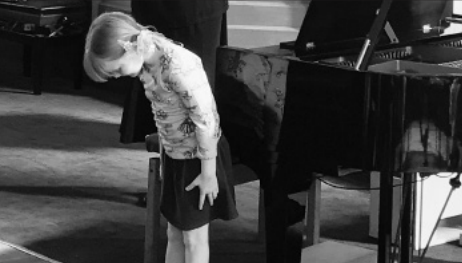In Praise of Praise
Zohara Rotem
We all need to be seen. We cannot live in a vacuum. We need to feel we are on the right track, especially when we step into unfamiliar territories. At any age, we need to know we are witnessed and noticed. I invite you to use the word ‘praise’ as an expression of appreciation; a way to commend, congratulate, and honour. Let us use praise as acknowledgement and recognition. Let praise be a tool for encouragement and support that inspires confidence and fosters growth.
Why do we praise?
We want to support and motivate children to become confident and willing to develop their ability. According to Dr. Suzuki, “All children have the potential at birth to become persons of high ability.” We want to equip them with tools to use when they face challenges and hardships. Praise and encouragement act like signposts, noting actions positively in a way that invites repetition.
Is praise always effective or can it also be harmful?
Praise can be a powerful form of encouragement, but in some cases, it can undermine a child’s motivation. In her article The effects of praise: What scientific studies reveal about the right way to praise kids, Gwen Dewar, who analysed the effect of praise over thirty years of studies, lists the following guidelines for praise:
- Be sincere and specific with your praise.
- Praise kids only for traits they have the power to change.
- Use descriptive praise that conveys realistic, attainable standards.
- Be careful about praising kids for achievements that come easily.
- Be careful about praising kids for doing what they already love to do.
- Encourage kids to focus on mastering skills – not on comparing themselves to others.
Praise that refers to personality traits can have a damaging effect in the long run
When a child hears “You are wonderful!” or “You are amazing!” she feels good at first. It’s a temporary sensation that soon turns into anxiety. She doesn’t have a clue as to how to reproduce this ‘wonderfulness’ in order to get approval next time. If we say to a child, “This was an amazing performance,” his pleasant feeling won’t last long. He won’t know how to reproduce this “amazing performance”, and in fact it can lead to a decreased willingness to perform. What is going on in the child’s mind is something like this: “I don’t know what made this performance amazing. What if I can’t do it again? So maybe I’d better stop here…”
How do we make praise effective?
Praise the effort instead of the result – the effort can be replicated day in and day out. All professional musicians and artists will tell you that results can vary. We all have our good days and not-so-good days. Knowing that my efforts are noticed will make me want to try again. A different reaction happens in the child’s mind if we say: “I noticed you were taking your time to get ready before you started.” Or, “I had the feeling you were working at bringing out the different dynamics.” Or, “I think you played in the slow tempo your teacher recommended for the piece, didn’t you?” The child’s efforts are acknowledged, and she can reproduce these efforts, which makes her feel safe.
Praise the playing, not the person – Say, “The piece had some nice articulation,” instead of saying “You are articulating nicely; good boy.” (Please try to not use ‘good boy/girl’, as it has nothing to do with playing/working well). You can also acknowledge the body part doing the job (“Your thumb is…”), or to give the child room to evaluate themselves, rather than doing it for them, ask: “What do you think of…?”
What is the real challenge in giving effective praise?
In our day and age, we are bombarded with information about ‘how to’ and ‘how-not-to’ do things. We do our best to adopt the right wording to use with children and avoid unhelpful words, only to find out that we still struggle with establishing productive relationships around practice and working with our children. Why is that? We have to constantly check ourselves (“reflect”, said Suzuki). When we are fully present and really listen to our children, the praise and encouragement we are able to provide comes from a sincere and authentic place and is received by the children in the same manner.
Children may not obey, but children will listen. Children will look to you for which way to turn, To learn what to be. Careful before you say ‘Listen to me.’ Children will listen.
Stephen Sondheim
Zohara Rotem is a Suzuki Teacher Trainer





